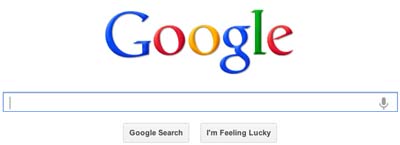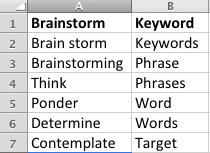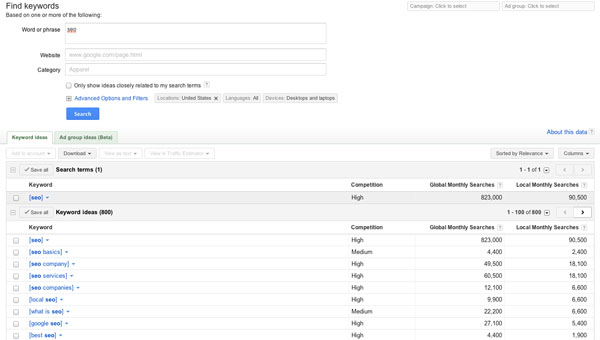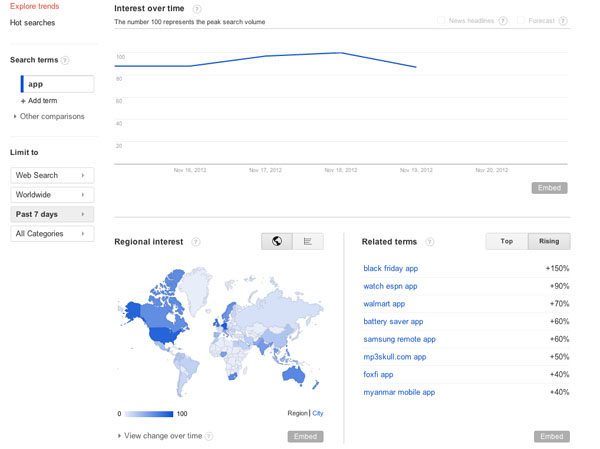Optimize your webpage for the best keywords.

Keywords are the words and phrases that people type into search engines. They are a crucial element of search engine optimization (SEO). Targeting and integrating effective keywords into your webpages is one of the most powerful means of increasing your PageRank. This is mainly because optimizing your content for keywords allows search engines to:
- Find your webpage easily
- View the targeted keywords as important to your webpage
- Increase your rank and visibility for the targeted keywords
Keyword Analysis
Before you start writing, you should always do a keyword analysis. A keyword analysis involves examining what keywords are being searched on the Internet and choosing the right keywords to optimize for on your webpages. It is never a good idea to just guess your target keywords, as you most likely will be missing out on some highly searched keywords that have not come to mind.
Step 1 – Brainstorm

Begin by brainstorming a list of obvious keywords that relate to your content. Although your analysis might show that many of the keywords you brainstormed are not popular searches and will not be your primary keywords, they still will be useful to scatter throughout your body text. Consider synonyms, singulars, plurals, hyphens, and split or merged words (e.g. well being vs wellbeing vs well-being).
Step 2 – Competitor Analysis

- Do a search with keywords relating to your page and see who is at the top of the search engine results.
- Make note of the keywords the highly ranked pages are targeting. What keywords appear in the titles? What keywords appear frequently throughout the body of the post/article?
- You can also examine competitor’s keyword tags by choosing View > View Source in your browser’s menu bar. Find the keyword tags by holding command+F (Mac) or control+F (Windows) and searching for . You might find useful keywords inside this tag.
Step 3 – Keyword Tools
Use keyword tools to discover additional keywords and determine what keywords are most important.
Google AdWords Keyword Tool

The Google AdWords Keyword Tool helps you evaluate the performance of different keywords based on estimated monthly searches and advertising competition. The valuable keyword tool also helps you discover new keywords relevant to your post.
-
- Go to the Google AdWords Keyword Tool – https://adwords.google.com/o/KeywordTool
- Unless you sign up for Google AdWords PPC account, you will only be able to see the first 100 results. You can sign up for an AdWords account for free and not run any ads – totally hassle free.
- In the search box, type a keyword you think people may use to search for your page and click Search.
- Click the Keywords Ideas tab – this will return a list of keywords, showing you an estimate of often that term and related terms are searched on Google and partner sites. This list also measures the advertising competition of different keywords, or how much advertisers are willing to Pay Per Click (PPC) for their ads.
- Reset the Match Type boxes – uncheck Broad Match and select Exact Match.
- Exact Match: Returns data for searches that contain the exact phrase.
- Broad Match: Returns data for synonyms, related searches, and other relevant variations.
- Phrase Match: Returns data for searches containing the exact phrase or the exact phrase in combination with other words.
- Compare the results for Broad Match in the previous slide and you will see very different data. The Broad Match data for the keyword seo takes into account various other search terms, such as search engine, website, Google, etc. If you are writing a post specifically on SEO, you might not want to direct someone searching for website to your page. This is why it is important to analyze Exact Match data.
- Go to the Google AdWords Keyword Tool – https://adwords.google.com/o/KeywordTool
Google Trends

Google Trends provides insights into the search terms people have been using in Google’s search engine. It is a good tool to use to identify keyword trends.
- Go to www.google.com/trends/
- Type a keyword into the search box relevant to your post/article. E.g. If I want to discover a highly searched iPhone app within a certain time period, I might enter the keyword app.
- One you have searched for your keyword, you should set your filters. You can limit your search by type of search, location, date, and category.
- You will find details on the top related terms, and the rising related terms. Top related terms tend to be more competitive, while rising related terms tend to be fresher and trending, with less competition.
Once you have completed your keyword analysis, you must choose good keywords to target on your pages.
